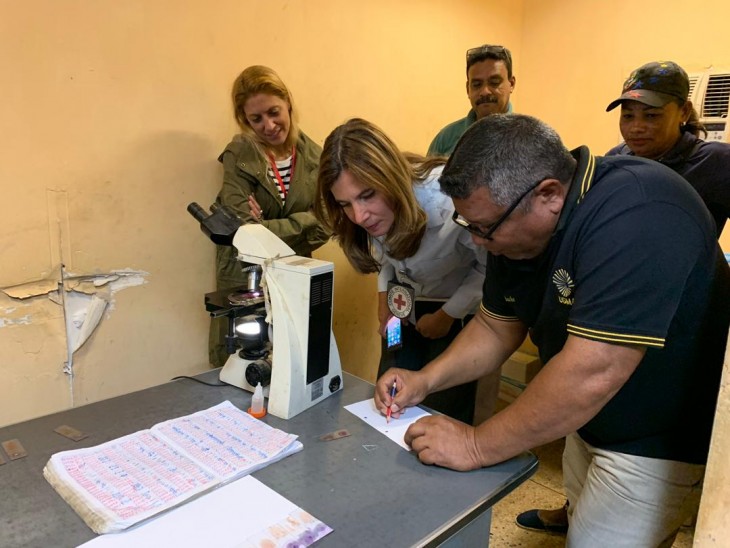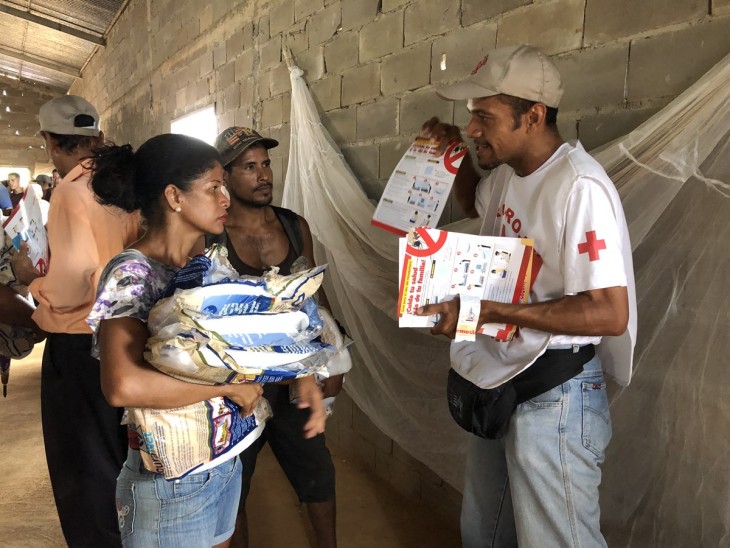Venezuela: Making access to health care a priority

The current situation in Venezuela is extremely complex. Some areas are experiencing limited access to health care, water, sanitation and hygiene services, and the population is being exposed to a disconcerting degree of violence. The ICRC has intensified humanitarian work in the country by running more health care activities in response to the population’s most urgent needs. Pilar Bauza, the ICRC´s health coordinator in Venezuela, tells us about the work the organization has been doing this year.
Could you give us a general overview of the health sector in Venezuela?
Venezuela continues to suffer the consequences of a deteriorating socioeconomic situation, which has had a direct impact on the health sector. There is a shortage not only of medicines but of diagnostic equipment, hygiene products and medical furniture. Further causes for concern are the lack of health infrastructure maintenance and problems with access to water and the power supply, without which it is impossible for a hospital or health centre to run effectively.
Another important factor affecting the health sector is the lack of specialists who can provide the services and care required by the population. For instance, in the most affected areas, a 500-bed hospital that previously offered up to twenty medical specialties is now only able to offer five due to the lack of medical specialists. The shortage of necessary resources, supplies and equipment aggravates this situation. At the same time, the population’s needs are on the rise, as are the number of patients who check in to the ER as a consequence of violence. For all these reasons, the ICRC is focused on working closely with health centres, in order to save more lives.
People who live in areas affected by armed violence are even less likely to have quick and efficient access to essential health care services, and hence are the most vulnerable.
What programmes or activities is the ICRC carrying out this year?
The strategy we are implementing in the country is patient-centred, and therefore we are trying to ensure that all the ICRC’s health team work is focused on strengthening the health care system and outpatient care (the care chain) in order to ensure access to health care for those who live in the most vulnerable areas.
To this end we run a first aid programme aimed at strengthening the skills needed to stabilize critically ill patients, alongside which we provide support for those in the country who are already involved in pre-hospital care, which involves repairing ambulances, distributing medical supplies and training health professionals.
We also provide technical support to hospitals by training their staff in how to treat people injured by firearms, explosions and other traumas. We make donations of medical supplies and equipment, and carry out infrastructure improvements to back up the power and water supply in the emergency rooms in which health professionals work on a daily basis.
In some border regions, we carry out preventive and primary care activities aimed at supporting health care institutions whose capacity has been exceeded, so that they can continue to provide services to their community as well as to those who are passing through the area.
At each stage of the process, we work with the community and with local and national health organizations to coordinate activities and ensure that patients receive the uninterrupted treatment they need.
In addition, we work alongside prison authorities to ensure that people deprived of their freedom have decent living conditions. We aim to improve health care and support the authorities' efforts to improve prison infrastructures. This year, we have facilitated more than 7,000 basic and emergency medical consultations for detainees in seven prisons in Venezuela.

Now that malaria has spread to emergency levels in Venezuela, how does the ICRC help those affected?
Over 50% of all malaria cases in Latin America occur in Venezuela, 70 per cent of which are in the state of Bolívar, where the outbreak of malaria is undoubtedly a great cause for concern. It is here the ICRC has focused its efforts, working tirelessly on preventive actions such as the distribution of almost 50,000 mosquito nets to those living in the municipality of El Callao.
We are also focused on increasing the number of diagnostic and treatment centres available in the state, and on building up the pre-existing knowledge and skills of staff and volunteers who are already working in the area, so that they will be able to provide the necessary treatment for a greater number of people. To this end, we ensure there is a constant provision of the medical supplies required for identifying, diagnosing and treating malaria, in addition to specialized training for microscopists, and training in rapid diagnostic tests. This is our contribution to the Venezuelan health authorities’ National Malaria Emergency Response Plan.
What challenges does the ICRC face in responding to the population’s health needs?
The ICRC has been running its health care activities since January 2019, particularly in priority areas and states. To run our programmes in Venezuela, medical supplies need to be imported and distributed, and health care professionals have to be trained, all of which require a huge amount of coordination on behalf of our local staff as well as the logistics, water and sanitation, communication and administration teams. We were able to achieve this thanks to the cooperation of and ongoing dialogue with authorities, key stakeholders and the population. This was one of the big challenges we faced in the beginning, when they still did not know us.
At times we have faced the difficult task of having to prioritize. Now that we are running more activities and working more closely with communities, we have started to identify additional needs that we think we could meet, but we do not always have the capacity to do so. We are committed to doing everything we can within the remit and scope of the ICRC's mission.
How do you coordinate your humanitarian work in Venezuela with the Venezuelan Red Cross and the International Federation of the Red Cross?
Thankfully, the work done in partnership with the Venezuelan Red Cross (VRC), the International Federation of Red Cross and Red Crescent Societies (IFRC) and the ICRC has been key to overcoming challenges and promoting relevant activities that cater for the growing humanitarian needs of Venezuelans. The IFRC and the ICRC provide continual support to the VRC through training events, technical guidance, and equipment and supplies for the VRC’s volunteers, thanks to whom we are able to carry out a large number of our activities. For example, the VRC, with the technical support of the ICRC, respond to the population’s pre-hospital needs on a daily basis, particularly during events, protests, or at key locations, by providing first aid care and ambulance services. As a Movement, our commitment to preventing and alleviating human suffering in Venezuela remains exactly the same.

What are the ICRC's expectations for 2020 and what priority projects will be implemented or continued?
In 2020, we intend to consolidate our current activities, and to keep playing a part in the different levels of health care within the Venezuelan public health system. We will continue to focus on the needs of the most vulnerable populations (such as detainees or the injured), as well as on essential services (both in primary and hospital health care). Another important objective is to facilitate access to health care services and to promote their proper use. We would also like to start making progress in the area of mental health, particularly in populations affected by violence as it would be very limited of us to focus only on physical health. We want to truly understand people’s concerns and to respond to them to the best of our ability.
